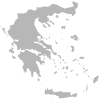Leda
Leda, whose affections Zeus won under the form of a swan, was the daughter of Thestius, king of Ætolia.
Her twin-sons, Castor and (Polydeuces or) Pollux,were renowned for their tender attachment to each other. They were also famous for their physical accomplishments, Castor being the most expert charioteer of his day, and Pollux the first of pugilists.
Their names appear both among the hunters of the Calydonian boar-hunt and the heroes of the Argonautic expedition.
The brothers became attached to the daughters of Leucippus, prince of the Messenians, who had been betrothed by their father to Idas and Lynceus, sons of Aphareus. Having persuaded Leucippus to break his promise, the twins carried off the maidens as their brides. Idas and Lynceus, naturally furious at this proceeding, challenged the Dioscuri to mortal combat, in which Castor perished by the hand of Idas, and Lynceus by that of Pollux.
Zeus wished to confer the gift of immortality upon Pollux, but he refused to accept it unless allowed to share it with Castor. Zeus gave the desired permission, and the faithful brothers were both allowed to live, but only on alternate days.
The Dioscuri received divine honours throughout Greece, and were worshipped with special reverence at Sparta.
From: Berens, E.M. The Myths and Legends of Ancient Greece and Rome. New York: Maynard, Merril, & Co., 1880. Text in the public domain.

